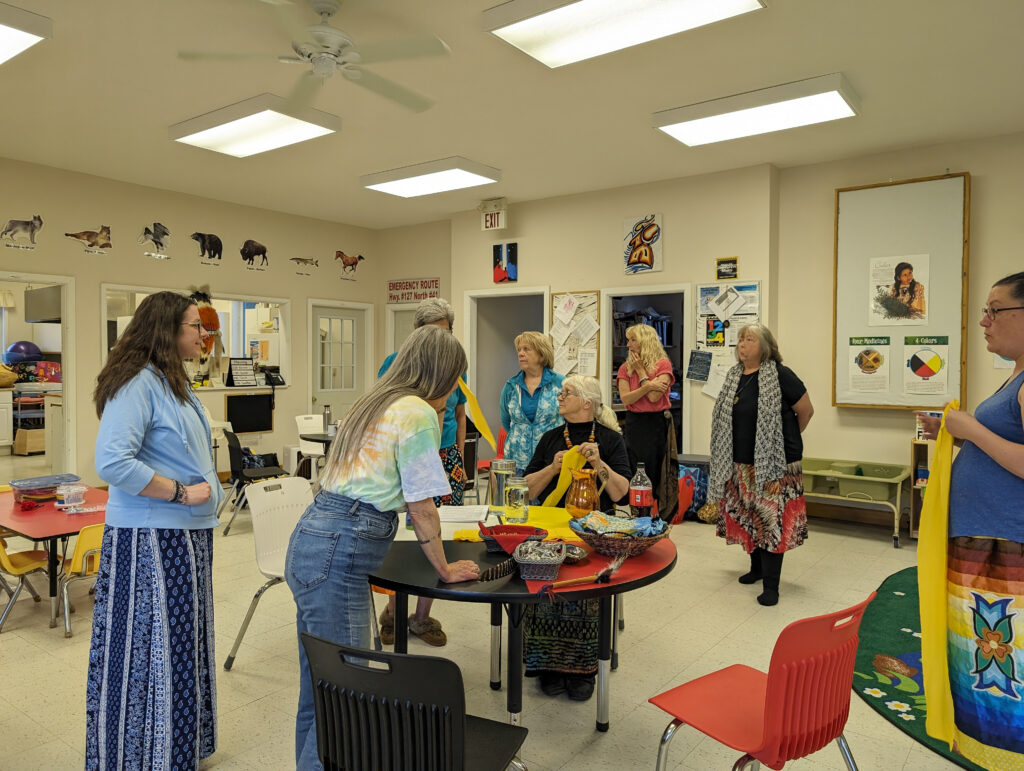Algonquin Family Centre hosts Full Moon Ceremony

By Kaitlin Sylvester
On the serene evening of May 23, the Inòdewiziwin Center in Maynooth hosted its sixth full moon ceremony, a sacred gathering that has become a cherished event for the Kijicho Manito Madaouskarini Algonquin First Nation. This month's ceremony, under the luminous flower moon, was particularly special, drawing women from the community to celebrate and support each other.
Diane Martin and Gidge Tinney, who lead the ceremonies say the ritual is open to all women in the region, including trans and two-spirited individuals. The ceremony's authenticity and respect for tradition are paramount. Martin emphasized the importance of learning from a knowledgeable elder, not just through casual reading or superficial understanding. “We made sure to go to someone who performs the ceremony, learn it thoroughly, and then bring it back to our community in the right way.”
The journey to this point began with the guidance of Elder Amy Bailey from Golden Lake. said Martin. “Elder Bailey took me under her wing, sharing her vast knowledge openly. I spent time with her, asking countless questions about the ceremony's intricacies, what's acceptable, and what's not. She guided me through multiple ceremonies, gradually preparing me to lead our community in these sacred traditions.”
As the ceremony commenced, participants were encouraged to create tobacco ties, a vital part of the full moon ritual. The yellow flags, smaller than traditional sizes but significant nonetheless, were filled with tobacco and held close to the heart throughout the ceremony. These ties represented the worries, sorrows, and thoughts of the women, which would later be released in the ceremonial fire.
The ceremony began with a sharing circle, where women sat together, passing a feather around as a talking piece. This practice allows each woman to share her burdens and celebrate her joys in a supportive and non-judgmental environment. “It's about supporting and celebrating our womanhood,” Tinney explained. “Whether pre-menstrual, menstruating, or menopausal, every woman has a place in this circle.”
The sharing circle often saw the feather pass around more than once, as the trust within the group grew and more women felt comfortable sharing. “There's an energy that builds within the circle as you share,” Martin noted. “It's a safe space to tell your story without judgment. It's a powerful experience of communal support.”
While the ceremony holds deeply traditional roots, Martin and Tinney also embrace the contemporary realities of the local residents. Tinney, having grown up outside traditional indigenous culture, acknowledges a blend of traditional and modern perspectives. “I grew up without culture, as a white woman, and as a feminist of the ‘60s, ‘70s, ‘80s, and ‘90s. There are traditions I choose to follow and others I respectfully decline.”
This modern perspective does not diminish the ceremony's authenticity but rather enriches it, showing that traditions can evolve while maintaining their core essence. “Before colonialism, our cultures saw women and men as equals. We strive to honour that balance, even as we navigate the modern world.”
One of the most poignant moments of the ceremony came from Martin's interaction with nature. “I spent an hour with the bumblebees in the lilacs, observing them and connecting with their energy. It reminded me to slow down and appreciate the small moments,” she shared. The fifth moon of creation is the Flower Moon, where all plants display their Spirit sides for all the world. To see this life-giving energy is one of the most powerful healing medicines on Mother Earth, say Tinney and Martin.
As the ceremony concluded, participants moved outside to stand in a circle around the fire. Starting from the Eastern doorway, each woman offered her tobacco tie to the fire, symbolizing the release of her burdens. “We hold the tie in our left hand, close to our heart, and put our final thoughts into it before placing it into the fire,” Martin explained. “This act releases our worries and sends them to the Creator for guidance.”
The full moon ceremony at the Inòdewiziwin Center is a lifeline for women seeking connection, support, and a deeper understanding of their heritage. As the community continues to grow and reclaim its culture, such ceremonies will remain vital, offering a space for healing, celebration, and unity for all women.
Next month, the community will celebrate National Indigenous Peoples Day with a sunrise ceremony at 6 a.m. on June 21 at Millennium Park. The next full moon ceremony will take place on Aug. 19.
|
